Secretaria Regional das Finanças, Planeamento e Administração Pública
Investimento de empresas candidatado ao IFIC-Açores supera os 252 milhões de euros
Investimento de empresas candidatado ao IFIC-Açores supera os 252 milhões de euros
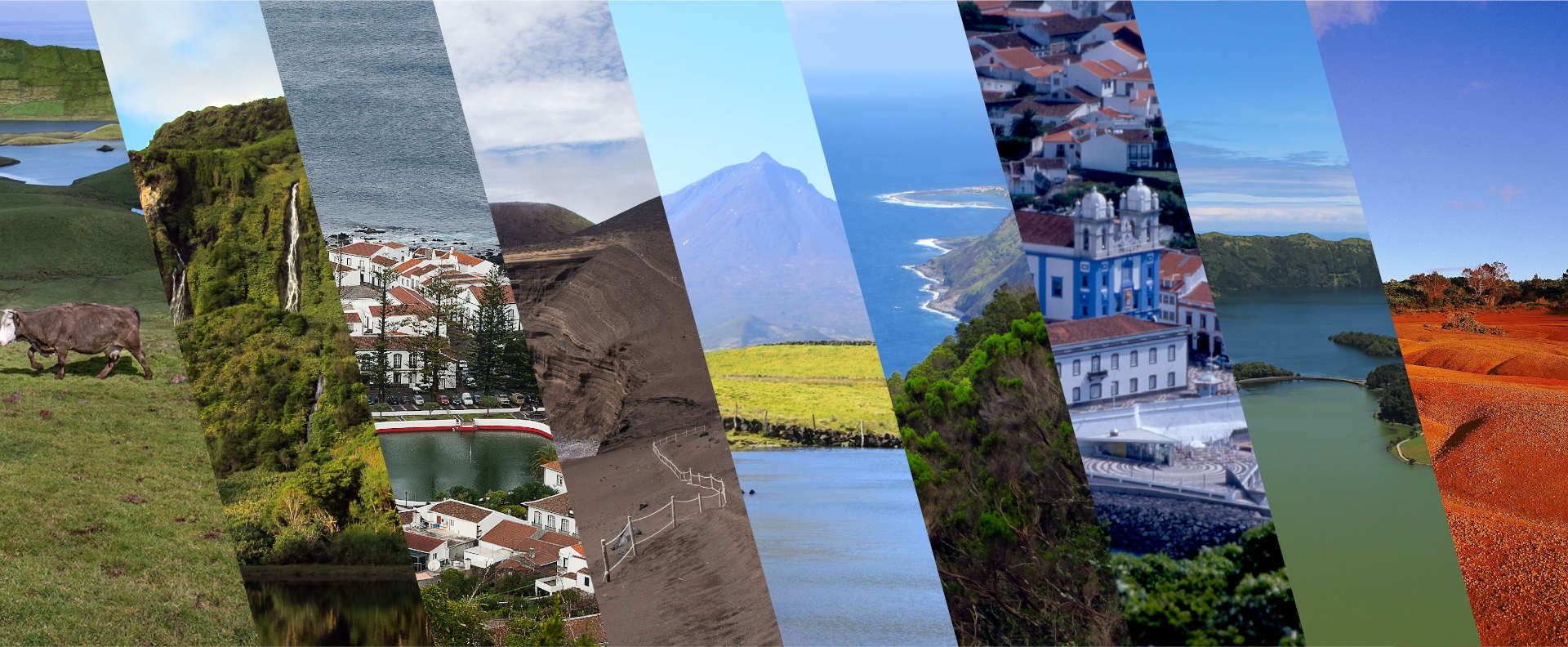
Secretaria Regional da Saúde e Segurança Social
Nota à imprensa - Funcionamento dos serviços de Ginecologia e Obstetrícia no HSEIT
Nota à imprensa - Funcionamento dos serviços de Ginecologia e Obstetrícia no HSEIT
Secretaria Regional do Ambiente e Ação Climática
Alonso Miguel highlights key role of nature rangers in environmental preservation and nature conservation
Alonso Miguel highlights key role of nature rangers in environmental preservation and nature conservation
Secretaria Regional da Agricultura e Alimentação
Regional Secretariat for Agriculture and Food promotes participation of 20 Azorean companies in Lisbon Food Affair 2026
Regional Secretariat for Agriculture and Food promotes participation of 20 Azorean companies in Lisbon Food Affair 2026
Government Members Appointments
 Feb
4
Feb
4
 Feb
4
Feb
4
 Feb
5
Feb
5
 Feb
5
Feb
5
 Feb
4
Feb
4
11:00
Reunião política da Comissão Interministerial dos Assuntos Europeus
 Palácio da Cova da Moura, rua Cova da Moura, em Lisboa.
Palácio da Cova da Moura, rua Cova da Moura, em Lisboa.
 Palácio da Cova da Moura, rua Cova da Moura, em Lisboa.
Palácio da Cova da Moura, rua Cova da Moura, em Lisboa.
Vice-Presidente do Governo
 Feb
4
Feb
4
20:30
Apresentação do Relatório das Propostas Orientadoras para a Intervenção e Requalificação da Fábrica do Álcool
 Nonagon - Parque de Ciência e Tecnologia de São Miguel, na Lagoa.
Nonagon - Parque de Ciência e Tecnologia de São Miguel, na Lagoa.
 Nonagon - Parque de Ciência e Tecnologia de São Miguel, na Lagoa.
Nonagon - Parque de Ciência e Tecnologia de São Miguel, na Lagoa.
Secretário Regional das Finanças, Planeamento e Administração Pública
 Feb
5
Feb
5
11:00
Lançamento da primeira pedra da empreitada de execução das infraestruturas do loteamento da Nossa Senhora do Rosário
 rua do Navio, Capelas, concelho de Ponta Delgada.
rua do Navio, Capelas, concelho de Ponta Delgada.
 rua do Navio, Capelas, concelho de Ponta Delgada.
rua do Navio, Capelas, concelho de Ponta Delgada.
Secretária Regional da Juventude, Habitação e Emprego
 Feb
5
Feb
5
17:30
Apresentação do Relatório das Propostas Orientadoras para a Intervenção e Requalificação da Fábrica do Açúcar
 Teatro Micaelense - Centro Cultural e de Congressos, em Ponta Delgada.
Teatro Micaelense - Centro Cultural e de Congressos, em Ponta Delgada.
 Teatro Micaelense - Centro Cultural e de Congressos, em Ponta Delgada.
Teatro Micaelense - Centro Cultural e de Congressos, em Ponta Delgada.
Secretário Regional das Finanças, Planeamento e Administração Pública
Latest News


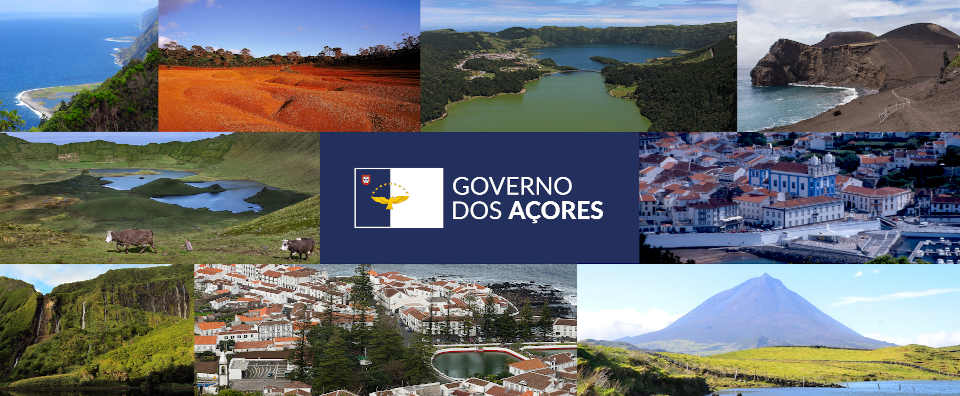

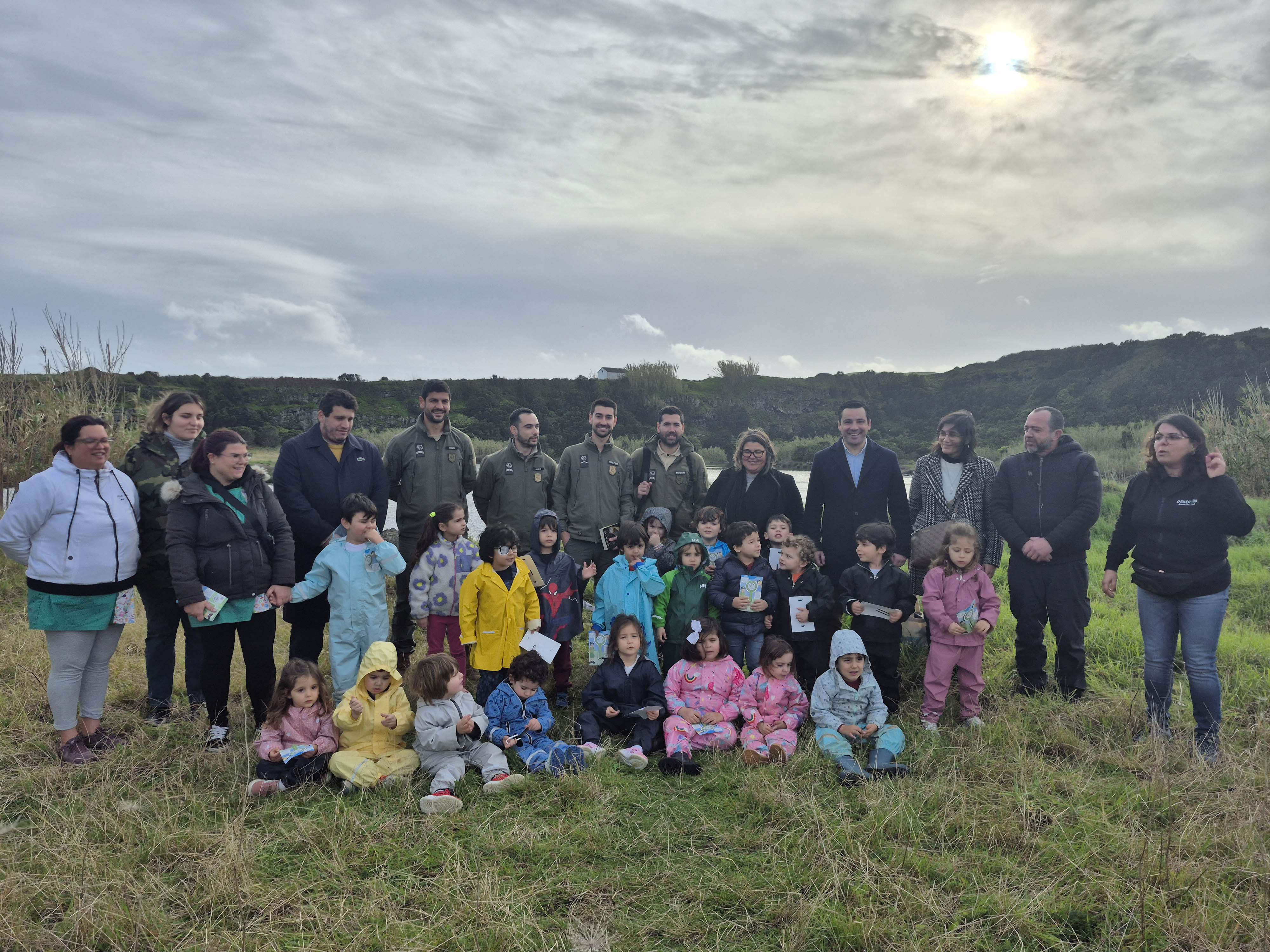






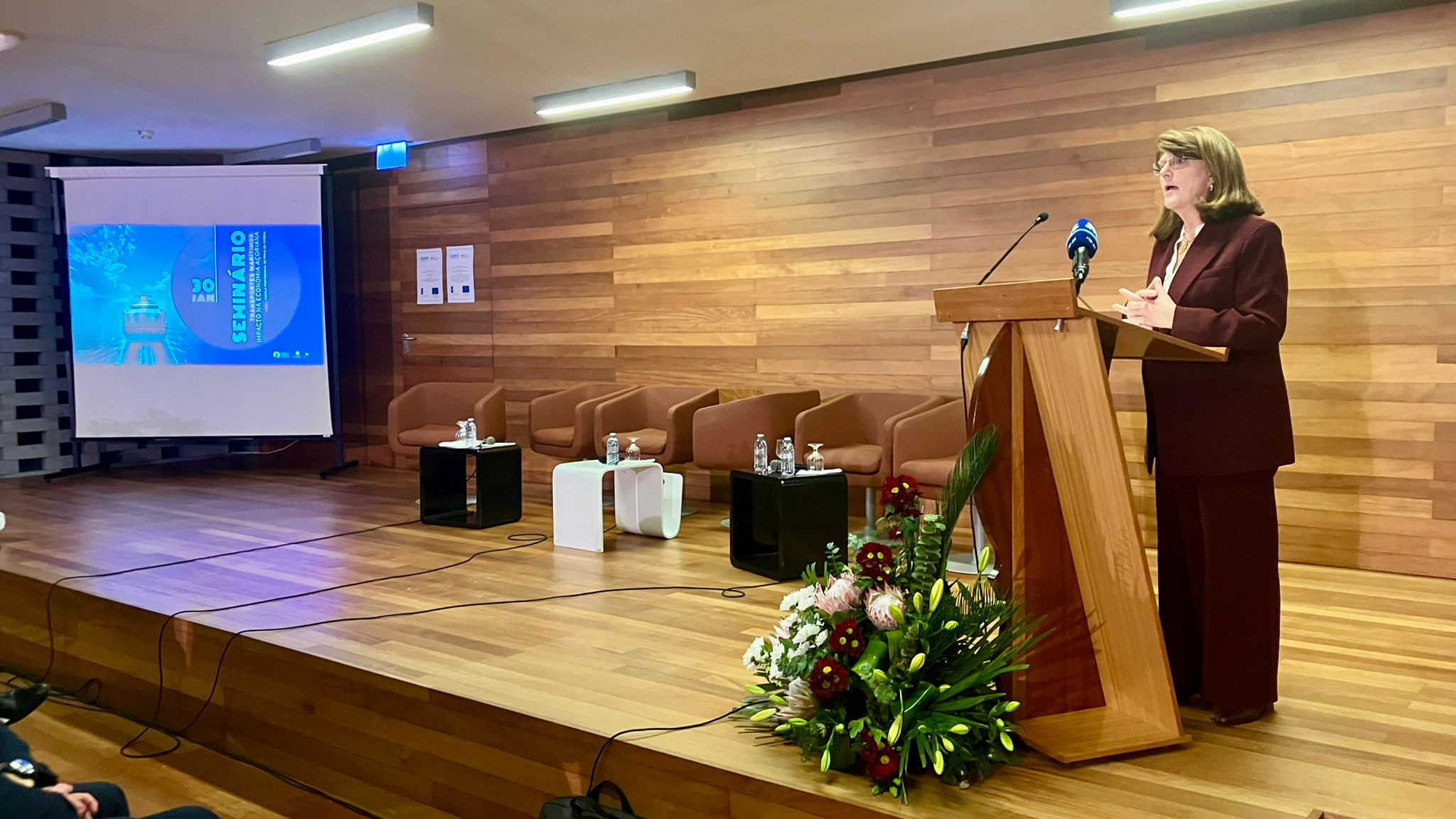

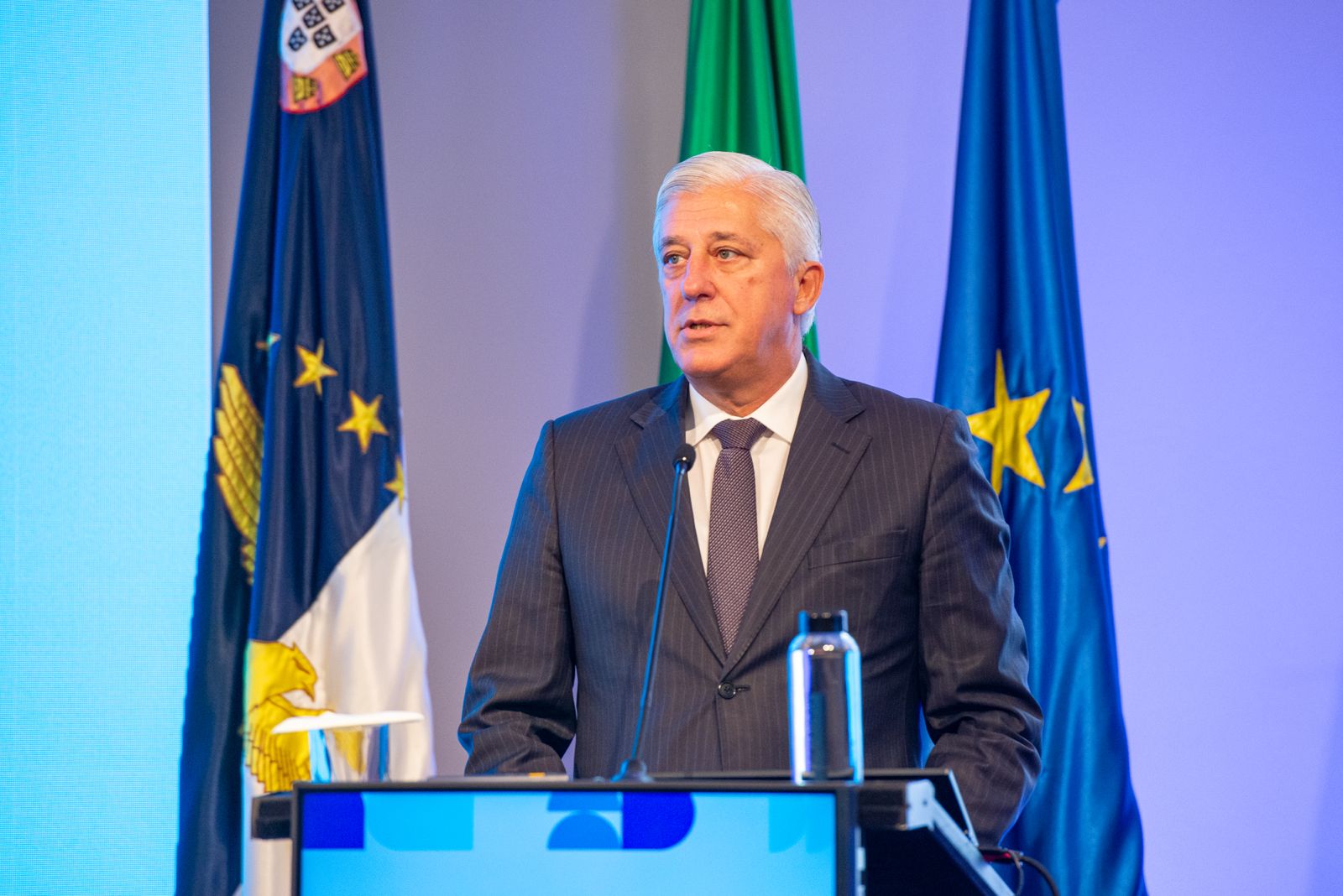



Nota de Imprensa
February 4, 2026
Investimento de empresas candidatado ao IFIC-Açores supera os 252 milhões de euros
Até 30 de janeiro foram recebidas 74 candidaturas ao IFIC – Instrumento Financeiro para a Inovação e Competitividade, às quais corresponde a um valor global de investimento superior a 252 milhões de euros. A Secretaria Regional das Finanças, Planeamento e Administração Pública congratula-se com a forte adesão do tecido empresarial regional a este novo instrumento, integrado no PRR destinado aos Açores, e cuja concretização foi possível na sequência da última reprogramação e do esforço do Governo Regional para assegurar as condições necessárias à sua operacionalização e adaptação à realidade regional. Este trabalho permitiu disponibilizar um mecanismo de apoio ao investimento empresarial alinhado com os objetivos de modernização, competitividade e crescimento económico da Região. A elevada adesão ao IFIC, tanto em termos de número de candidaturas como dos montantes de investimento propostos, evidencia o dinamismo das empresas e da economia regional e confirmam que as empresas dos Açores têm iniciativas e estão disponíveis na concretização de novos projetos que contribuem para a criação de valor, reforço da competitividade, da inovação e do crescimento. A Secretaria Regional das Finanças, Planeamento e Administração Pública sublinha ainda que o esforço de divulgação e proximidade desenvolvido pela Direção Regional do Empreendedorismo e Competitividade, ao longo do período para a submissão de candidaturas, contribuiu para a aproximação ao tecido empresarial regional e facilitou o acesso das empresas a esta oportunidade de financiamento europeu. Os investimentos propostos através destas candidaturas terão impacto direto na economia regional, contribuindo para mais riqueza, maior atividade empresarial e para a criação de postos de trabalho, com efeitos positivos na coesão e no desenvolvimento sustentável da Região.
February 4, 2026
Investimento de empresas candidatado ao IFIC-Açores supera os 252 milhões de euros
Até 30 de janeiro foram recebidas 74 candidaturas ao IFIC – Instrumento Financeiro para a Inovação e Competitividade, às quais corresponde a um valor global de investimento superior a 252 milhões de euros. A Secretaria Regional das Finanças, Planeamento e Administração Pública congratula-se com a forte adesão do tecido empresarial regional a este novo instrumento, integrado no PRR destinado aos Açores, e cuja concretização foi possível na sequência da última reprogramação e do esforço do Governo Regional para assegurar as condições necessárias à sua operacionalização e adaptação à realidade regional. Este trabalho permitiu disponibilizar um mecanismo de apoio ao investimento empresarial alinhado com os objetivos de modernização, competitividade e crescimento económico da Região. A elevada adesão ao IFIC, tanto em termos de número de candidaturas como dos montantes de investimento propostos, evidencia o dinamismo das empresas e da economia regional e confirmam que as empresas dos Açores têm iniciativas e estão disponíveis na concretização de novos projetos que contribuem para a criação de valor, reforço da competitividade, da inovação e do crescimento. A Secretaria Regional das Finanças, Planeamento e Administração Pública sublinha ainda que o esforço de divulgação e proximidade desenvolvido pela Direção Regional do Empreendedorismo e Competitividade, ao longo do período para a submissão de candidaturas, contribuiu para a aproximação ao tecido empresarial regional e facilitou o acesso das empresas a esta oportunidade de financiamento europeu. Os investimentos propostos através destas candidaturas terão impacto direto na economia regional, contribuindo para mais riqueza, maior atividade empresarial e para a criação de postos de trabalho, com efeitos positivos na coesão e no desenvolvimento sustentável da Região.


Nota de Imprensa
February 3, 2026
Nota à imprensa - Funcionamento dos serviços de Ginecologia e Obstetrícia no HSEIT
A Secretaria Regional da Saúde e Segurança Social (SRSSS) vem esclarecer, relativamente à notícia hoje divulgada sobre o funcionamento dos serviços de Ginecologia e Obstetrícia no Hospital de Santo Espírito da Ilha Terceira (HSEIT), que lamenta que a informação tenha sido divulgada através de suspeitas anónimas, sem fontes em 'on' de grávidas ou profissionais de saúde - regista-se também que a SRSSS não foi sequer contactada sobre o tema, o que contribuiu para uma leitura alarmista da situação, gerando preocupação desnecessária junto das utentes e da população em geral. É importante reconhecer que o Serviço Regional de Saúde enfrenta constrangimentos pontuais ao nível dos recursos humanos, situação que se insere numa realidade mais ampla do Serviço Nacional de Saúde, sentida em várias regiões do país, particularmente na área da ginecologia e obstetrícia. Ainda assim, estes constrangimentos não colocam em causa a segurança clínica das utentes, nem significam a interrupção dos cuidados prestados. Importa ainda referir que a Direção Regional da Saúde não tem registo de queixas recentes relativas ao funcionamento destes serviços. O HSEIT tem garantido o acompanhamento às grávidas, a resposta às situações urgentes e a realização de partos, contando atualmente com 12 médicos a prestar serviço na área da ginecologia e obstetrícia, em diferentes regimes de trabalho. Em consequência, a maioria das utentes tem sido atendida dentro do Tempo Máximo de Resposta Garantido. O Conselho de Administração do HSEIT tem trabalhado, em articulação com as chefias clínicas e com os profissionais de saúde, no sentido de aumentar os recursos humanos do serviço, de forma a reorganizar escalas, reduzir a sobrecarga assistencial e reforçar progressivamente a capacidade de resposta, valorizando o empenho e a dedicação das equipas que asseguram diariamente estes cuidados. A SRSSS reafirma que a segurança das grávidas e dos recém-nascidos é e continuará a ser uma prioridade absoluta, mantendo um acompanhamento próximo da situação no HSEIT e garantindo que continuarão a ser implementadas todas as medidas necessárias para assegurar cuidados de saúde adequados, seguros e humanizados.
February 3, 2026
Nota à imprensa - Funcionamento dos serviços de Ginecologia e Obstetrícia no HSEIT
A Secretaria Regional da Saúde e Segurança Social (SRSSS) vem esclarecer, relativamente à notícia hoje divulgada sobre o funcionamento dos serviços de Ginecologia e Obstetrícia no Hospital de Santo Espírito da Ilha Terceira (HSEIT), que lamenta que a informação tenha sido divulgada através de suspeitas anónimas, sem fontes em 'on' de grávidas ou profissionais de saúde - regista-se também que a SRSSS não foi sequer contactada sobre o tema, o que contribuiu para uma leitura alarmista da situação, gerando preocupação desnecessária junto das utentes e da população em geral. É importante reconhecer que o Serviço Regional de Saúde enfrenta constrangimentos pontuais ao nível dos recursos humanos, situação que se insere numa realidade mais ampla do Serviço Nacional de Saúde, sentida em várias regiões do país, particularmente na área da ginecologia e obstetrícia. Ainda assim, estes constrangimentos não colocam em causa a segurança clínica das utentes, nem significam a interrupção dos cuidados prestados. Importa ainda referir que a Direção Regional da Saúde não tem registo de queixas recentes relativas ao funcionamento destes serviços. O HSEIT tem garantido o acompanhamento às grávidas, a resposta às situações urgentes e a realização de partos, contando atualmente com 12 médicos a prestar serviço na área da ginecologia e obstetrícia, em diferentes regimes de trabalho. Em consequência, a maioria das utentes tem sido atendida dentro do Tempo Máximo de Resposta Garantido. O Conselho de Administração do HSEIT tem trabalhado, em articulação com as chefias clínicas e com os profissionais de saúde, no sentido de aumentar os recursos humanos do serviço, de forma a reorganizar escalas, reduzir a sobrecarga assistencial e reforçar progressivamente a capacidade de resposta, valorizando o empenho e a dedicação das equipas que asseguram diariamente estes cuidados. A SRSSS reafirma que a segurança das grávidas e dos recém-nascidos é e continuará a ser uma prioridade absoluta, mantendo um acompanhamento próximo da situação no HSEIT e garantindo que continuarão a ser implementadas todas as medidas necessárias para assegurar cuidados de saúde adequados, seguros e humanizados.

Nota de Imprensa
February 3, 2026
Alonso Miguel highlights key role of nature rangers in environmental preservation and nature conservation
The Regional Secretary for the Environment and Climate Action, Alonso Miguel, took part in an educational birdwatching session with an interpretive trail in Paul da Pedreira, held on Monday on the island of Terceira, as part of the celebrations for World Wetlands Day and National Nature Ranger Day. Promoted by nature rangers, the initiative involved 20 preschool children from the "O Gu e a Tita" kindergarten in Praia da Vitória. It aimed to reinforce the importance of preserving wetlands and raise awareness of the important role of nature rangers. The initiative was part of a wide-ranging programme of environmental education and awareness-raising activities to be carried out across the Azores islands between January 21 and February 5. "With a view to marking these important events, the Regional Secretariat for the Environment and Climate Action prepared a wide range of educational and environmental awareness activities, including lectures, field trips and visits to environmental centres, clean-up actions in public spaces and ecological restoration activities, interpretive trails and bird watching in wetlands. They are aimed at children and young people from different levels of education and the general public, with the indispensable participation of our Nature Rangers, in conjunction with the Environmental and Climate Action Services of the nine islands," stated the government official. Alonso Miguel emphasised that “wetlands are ecosystems of high ecological, environmental, landscape and social value, providing ecosystem services that are fundamental to the safety and well-being of populations, namely in terms of regulating the water cycle, protecting biodiversity, recharging aquifers and mitigating climate change effects." "As true biodiversity hotspots, wetlands are also prime locations for bird watching, an activity that is growing in popularity in the Azores and, as such, is an important tourist asset with economic relevance," he added. The Regional Secretary also pointed out that "the Azores have 13 wetlands classified as being of international importance under the Ramsar Convention, covering around 13,000 hectares." He added that "the Regional Government has been developing various structural nature conservation projects, with emphasis on LIFE projects, namely LIFE IP AZORES NATURA, which has a budget of over €19 million for investment in the protection and recovery of areas within the Natura 2000 Network. It also includes wetlands classified as Ramsar Sites in the Azores." The government official recalled that "this heritage is as valuable as it is sensitive and fragile. As such, it is important to ensure its protection and conservation through an integrated and multidisciplinary approach, seeking a balance between human beings and natural ecosystems, a mission in which nature rangers play a key role." On National Nature Ranger Day, Alonso Miguel took the opportunity “to pay tribute to the key role played by these professionals in preserving nature, protecting natural resources, as well as monitoring, supervising, and raising environmental awareness across all islands.” “Nature rangers are at the forefront when it comes to defending the environmental quality and unique natural heritage of the Azores, providing an invaluable contribution to the sustainable development of our islands.” Alonso Miguel recalled that "the Regional Government has been consistently increasing the human and operational resources allocated to nature rangers." In this regard, he highlighted the recently launched procedure to hire another 12 nature rangers, as well as the substantial investment in vehicles, inflatable boats, machinery, drones, uniforms and technical equipment for these professionals. This represents an overall investment surpassing €1 million, complemented by the provision of in-depth specialised training." He concluded: “These investments lead to better monitoring, inspection, and intervention on the ground, closer ties with the population, and better conditions to protect our natural resources, demonstrating the Regional Government's strong commitment to protecting the environment and sustainable development in the Region.”
February 3, 2026
Alonso Miguel highlights key role of nature rangers in environmental preservation and nature conservation
The Regional Secretary for the Environment and Climate Action, Alonso Miguel, took part in an educational birdwatching session with an interpretive trail in Paul da Pedreira, held on Monday on the island of Terceira, as part of the celebrations for World Wetlands Day and National Nature Ranger Day. Promoted by nature rangers, the initiative involved 20 preschool children from the "O Gu e a Tita" kindergarten in Praia da Vitória. It aimed to reinforce the importance of preserving wetlands and raise awareness of the important role of nature rangers. The initiative was part of a wide-ranging programme of environmental education and awareness-raising activities to be carried out across the Azores islands between January 21 and February 5. "With a view to marking these important events, the Regional Secretariat for the Environment and Climate Action prepared a wide range of educational and environmental awareness activities, including lectures, field trips and visits to environmental centres, clean-up actions in public spaces and ecological restoration activities, interpretive trails and bird watching in wetlands. They are aimed at children and young people from different levels of education and the general public, with the indispensable participation of our Nature Rangers, in conjunction with the Environmental and Climate Action Services of the nine islands," stated the government official. Alonso Miguel emphasised that “wetlands are ecosystems of high ecological, environmental, landscape and social value, providing ecosystem services that are fundamental to the safety and well-being of populations, namely in terms of regulating the water cycle, protecting biodiversity, recharging aquifers and mitigating climate change effects." "As true biodiversity hotspots, wetlands are also prime locations for bird watching, an activity that is growing in popularity in the Azores and, as such, is an important tourist asset with economic relevance," he added. The Regional Secretary also pointed out that "the Azores have 13 wetlands classified as being of international importance under the Ramsar Convention, covering around 13,000 hectares." He added that "the Regional Government has been developing various structural nature conservation projects, with emphasis on LIFE projects, namely LIFE IP AZORES NATURA, which has a budget of over €19 million for investment in the protection and recovery of areas within the Natura 2000 Network. It also includes wetlands classified as Ramsar Sites in the Azores." The government official recalled that "this heritage is as valuable as it is sensitive and fragile. As such, it is important to ensure its protection and conservation through an integrated and multidisciplinary approach, seeking a balance between human beings and natural ecosystems, a mission in which nature rangers play a key role." On National Nature Ranger Day, Alonso Miguel took the opportunity “to pay tribute to the key role played by these professionals in preserving nature, protecting natural resources, as well as monitoring, supervising, and raising environmental awareness across all islands.” “Nature rangers are at the forefront when it comes to defending the environmental quality and unique natural heritage of the Azores, providing an invaluable contribution to the sustainable development of our islands.” Alonso Miguel recalled that "the Regional Government has been consistently increasing the human and operational resources allocated to nature rangers." In this regard, he highlighted the recently launched procedure to hire another 12 nature rangers, as well as the substantial investment in vehicles, inflatable boats, machinery, drones, uniforms and technical equipment for these professionals. This represents an overall investment surpassing €1 million, complemented by the provision of in-depth specialised training." He concluded: “These investments lead to better monitoring, inspection, and intervention on the ground, closer ties with the population, and better conditions to protect our natural resources, demonstrating the Regional Government's strong commitment to protecting the environment and sustainable development in the Region.”


Nota de Imprensa
February 3, 2026
Regional Secretariat for Agriculture and Food promotes participation of 20 Azorean companies in Lisbon Food Affair 2026
The Regional Secretariat for Agriculture and Food, through the Azores Brand Management and Promotion Office, is promoting the participation of 20 Azorean companies in the 2026 edition of Lisbon Food Affair, which will take place in Lisbon between February 9 and 11. The Lisbon Food Affair is an exclusively professional trade fair for the Portuguese agrifood sector, bringing together food and beverage manufacturers and distributors, as well as equipment, service and technology companies serving the distribution and Horeca channel, both nationally and internationally. The presence of Azorean companies at this event is a strategic opportunity to meet buyers from various markets, contributing to the consolidation of their operations and opening up new possibilities for commercial expansion. The Autonomous Region of the Azores has been participating in the fair since 2024, with a presence in the Azores Brand space, the largest at the event. Companies have highlighted the importance of the numerous meetings held in the Hosted Buyers space, which have generated business opportunities and bolstered the internationalisation process of Azores Brand-certified products. In the 2026 edition, the following companies and their respective brands will be featured at the Azores Brand stand: AgroMarienseCoop CRL, Azores Farm, Azores Jerky, AzorGhee, Boa Fruta, Celeiro da Terra, Conseran, Conservas Santa Catarina, Fábrica de Licores Mulher de Capote, Chá Gorreana, Insulac, SA, Lactaçores UCRL, Mel do Atlântico, Milhafre dos Açores, Moaçor, MPD - Bensaude Distribuição, Quinta das Três Cruzes, Quintal dos Açores, Sociedade Corretora and Yoçor. It should be noted that Azorean products were awarded the LFA Innovation prize in 2024 and 2025 for the Bananika and Bananika Chips innovations, developed by the Terceira-based company Loop Pursuit, reinforcing national and international recognition of the quality and creativity of the Azorean agrifood sector. The Regional Secretary for Agriculture and Food, António Ventura, highlighted the importance of this participation in strengthening the competitiveness of Azorean products. "The presence of 20 Azorean companies at Lisbon Food Affair 2026 demonstrates, once again, the vitality, innovation capacity and quality of the Azorean agrifood sector. This is a strategic platform for boosting the visibility of the Azores brand, consolidating trade relations and unlocking new markets," he stressed. “The Regional Government of the Azores remains committed to supporting the internationalisation of our companies, promoting products that reflect the authenticity and excellence of what is produced in the archipelago. The distinctions achieved in recent years prove that the Azores have talent, creativity and an enormous potential on the national and international scene,” stated the government official.
February 3, 2026
Regional Secretariat for Agriculture and Food promotes participation of 20 Azorean companies in Lisbon Food Affair 2026
The Regional Secretariat for Agriculture and Food, through the Azores Brand Management and Promotion Office, is promoting the participation of 20 Azorean companies in the 2026 edition of Lisbon Food Affair, which will take place in Lisbon between February 9 and 11. The Lisbon Food Affair is an exclusively professional trade fair for the Portuguese agrifood sector, bringing together food and beverage manufacturers and distributors, as well as equipment, service and technology companies serving the distribution and Horeca channel, both nationally and internationally. The presence of Azorean companies at this event is a strategic opportunity to meet buyers from various markets, contributing to the consolidation of their operations and opening up new possibilities for commercial expansion. The Autonomous Region of the Azores has been participating in the fair since 2024, with a presence in the Azores Brand space, the largest at the event. Companies have highlighted the importance of the numerous meetings held in the Hosted Buyers space, which have generated business opportunities and bolstered the internationalisation process of Azores Brand-certified products. In the 2026 edition, the following companies and their respective brands will be featured at the Azores Brand stand: AgroMarienseCoop CRL, Azores Farm, Azores Jerky, AzorGhee, Boa Fruta, Celeiro da Terra, Conseran, Conservas Santa Catarina, Fábrica de Licores Mulher de Capote, Chá Gorreana, Insulac, SA, Lactaçores UCRL, Mel do Atlântico, Milhafre dos Açores, Moaçor, MPD - Bensaude Distribuição, Quinta das Três Cruzes, Quintal dos Açores, Sociedade Corretora and Yoçor. It should be noted that Azorean products were awarded the LFA Innovation prize in 2024 and 2025 for the Bananika and Bananika Chips innovations, developed by the Terceira-based company Loop Pursuit, reinforcing national and international recognition of the quality and creativity of the Azorean agrifood sector. The Regional Secretary for Agriculture and Food, António Ventura, highlighted the importance of this participation in strengthening the competitiveness of Azorean products. "The presence of 20 Azorean companies at Lisbon Food Affair 2026 demonstrates, once again, the vitality, innovation capacity and quality of the Azorean agrifood sector. This is a strategic platform for boosting the visibility of the Azores brand, consolidating trade relations and unlocking new markets," he stressed. “The Regional Government of the Azores remains committed to supporting the internationalisation of our companies, promoting products that reflect the authenticity and excellence of what is produced in the archipelago. The distinctions achieved in recent years prove that the Azores have talent, creativity and an enormous potential on the national and international scene,” stated the government official.

Nota de Imprensa
February 2, 2026
Azorean Government congratulates Nuno Bettencourt on winning Grammy
The President of the Azorean Government, José Manuel Bolieiro, congratulated Azorean guitarist Nuno Bettencourt, a native of Terceira Island, on winning the Grammy Award in the Best Rock Performance category for his performance of "Changes (Live From Villa Park / Back to the Beginning)," sung by Yungblud and awarded at the 2026 Grammy Awards. "It is a significant distinction that acknowledges high-quality work and a solid career," José Manuel Bolieiro stated, emphasising that this award "honours talent of Azorean origin and projects the name of the Azores in a highly demanding international context." “Nuno Bettencourt also represents a family of artists who have contributed to our identity and the promotion of Azorean culture,” the head of the Azorean Government noted, considering that this recognition “is a stimulus for the celebration of artistic and cultural creation.” The Government of the Azores hereby congratulates Nuno Bettencourt and sends its appreciation, wishing him continued success in a career marked by merit and excellence. Nuno Bettencourt, 59, is a member of the band Extreme, known for albums such as "Pornograffitti" and the more recent "Six," released in 2023. The Grammy Award-winning song was performed at what was the last concert by Ozzy Osbourne, a Black Sabbath musician who died a few weeks after the event that brought together dozens of musicians linked to rock and heavy metal.
February 2, 2026
Azorean Government congratulates Nuno Bettencourt on winning Grammy
The President of the Azorean Government, José Manuel Bolieiro, congratulated Azorean guitarist Nuno Bettencourt, a native of Terceira Island, on winning the Grammy Award in the Best Rock Performance category for his performance of "Changes (Live From Villa Park / Back to the Beginning)," sung by Yungblud and awarded at the 2026 Grammy Awards. "It is a significant distinction that acknowledges high-quality work and a solid career," José Manuel Bolieiro stated, emphasising that this award "honours talent of Azorean origin and projects the name of the Azores in a highly demanding international context." “Nuno Bettencourt also represents a family of artists who have contributed to our identity and the promotion of Azorean culture,” the head of the Azorean Government noted, considering that this recognition “is a stimulus for the celebration of artistic and cultural creation.” The Government of the Azores hereby congratulates Nuno Bettencourt and sends its appreciation, wishing him continued success in a career marked by merit and excellence. Nuno Bettencourt, 59, is a member of the band Extreme, known for albums such as "Pornograffitti" and the more recent "Six," released in 2023. The Grammy Award-winning song was performed at what was the last concert by Ozzy Osbourne, a Black Sabbath musician who died a few weeks after the event that brought together dozens of musicians linked to rock and heavy metal.

Nota de Imprensa
February 2, 2026
Berta Cabral says there is already new model for maritime transport in the Azores
The Regional Secretary for Tourism, Mobility and Infrastructures, Berta Cabral, stated on Friday that a new model for maritime freight transport in the Azores is already in operation, following a study commissioned by the Government. The government official spoke at the closing session of the Transport Seminar "Maritime Transport: Impact on the Azorean Economy," promoted by the Chamber of Commerce and Industry of Angra do Heroísmo in Praia da Vitória, Terceira Island. "We have conducted a pragmatic study, which focused on practical issues, and immediately moved on to implementing a new model. Today, we already have tangible results, such as weekly services on all islands, more port equipment, and adjustments to port operations," stated the government official. She added: “We have already implemented scenario 2 and are now moving progressively and safely towards the optimised mixed scenario.” The Regional Secretary also stated that maritime transport, especially freight transport, “is one of the structural pillars of the economy, territorial cohesion and the regular functioning of the Autonomous Region of the Azores.” Berta Cabral pointed out, however, that this is "one of the most complex issues in regional governance, as there are no magic solutions and there can never be any disruptions jeopardising public supply." The government official also stressed that, in an "dispersed and remote archipelago subject to permanent natural constraints," the maritime transport of goods goes far beyond a mere logistical operation. She added: "It is an essential and crucial service for supplying the islands, boosting the competitiveness of businesses, controlling context costs and ensuring the stability of the internal market." The Regional Secretary recalled that, for many years, this sector faced "irregular schedules, disparities in service between islands, lack of predictability, operational constraints and a model that did not always respond to the real needs of the regional economy." For this reason, the Regional Government has brought about a structural change in the maritime freight transport model, "which is experiencing growing pains and can never jeopardise the service or supply of any island." Throughout this process, she stressed, the Government "has never compromised on basic principles such as frequency, predictability, balanced territorial coverage and operational efficiency." The Regional Secretary took the opportunity to publicly thank the Independent Technical Commission, composed of João Carvalho, Ribeiro Pinto and Francisco Silva, for their professional, dedicated and impartial monitoring throughout the study. "In recent years, we have moved forward with a quiet but assertive reorganisation, without causing disruption and favouring safe and progressive evolution," she added. According to the government official, the increased frequency achieved enabled companies to ‘better plan their activities, reduce stock shortages, optimise supply chains, reduce indirect costs associated with logistical uncertainty and enhance the value of endogenous production." At the same time, the Regional Government has made strategic investments in modernising port infrastructures, equipment and operating conditions. "We have made up for historical delays, boosted the installed capacity and created better conditions for efficiency, safety and reliability in freight transport," she said. According to Berta Cabral, the Regional Port Authorities have invested more than €27 million in equipment since 2021, with more than €63 million currently underway and planned until 2028, including another two tugboats. Regarding port infrastructures, investments in the same period surpassed €201 million, with more than €316 million underway and planned until the end of 2028. Berta Cabral also highlighted the strengthening of coordination between the various public and private stakeholders. In this regard, she emphasised the "path of structural organisation of port operations, with the appropriate separation of duties between the Regional Port Authorities and other players in the sector, as well as greater coordination and optimisation of available resources." She recalled that the preliminary process leading to the sale of public holdings in the companies OperPDL, OperTER and OperTRI is currently underway. Furthermore, she pointed out that it is also important to improve the coordination of local traffic with national and international logistics chains. "This factor is particularly relevant for export sectors and companies depending on imported raw materials," she said. "Today, we have more vessels, more links, greater predictability, better operational efficiency and greater responsiveness to the needs of our populations. We are reducing disparities between islands and contributing to greater territorial cohesion," she also stated. Regarding maritime passenger transport, Berta Cabral highlighted the recovery of Atlânticoline, "now a healthy company and an example for the entire public business sector in the Azores." She also noted the consolidation of the model based on public service obligations, ensuring inter-island mobility with predictability, financial responsibility, and adequacy to actual demand. Berta Cabral reiterated the Regional Government's commitment to regard maritime transport as "an integrated public policy, where logistics, economy, territorial cohesion and sustainability run side by side." "We will continue to invest where it is strategic, adjust the model whenever necessary and work closely with operators, chambers of commerce and economic agents," she concluded.
February 2, 2026
Berta Cabral says there is already new model for maritime transport in the Azores
The Regional Secretary for Tourism, Mobility and Infrastructures, Berta Cabral, stated on Friday that a new model for maritime freight transport in the Azores is already in operation, following a study commissioned by the Government. The government official spoke at the closing session of the Transport Seminar "Maritime Transport: Impact on the Azorean Economy," promoted by the Chamber of Commerce and Industry of Angra do Heroísmo in Praia da Vitória, Terceira Island. "We have conducted a pragmatic study, which focused on practical issues, and immediately moved on to implementing a new model. Today, we already have tangible results, such as weekly services on all islands, more port equipment, and adjustments to port operations," stated the government official. She added: “We have already implemented scenario 2 and are now moving progressively and safely towards the optimised mixed scenario.” The Regional Secretary also stated that maritime transport, especially freight transport, “is one of the structural pillars of the economy, territorial cohesion and the regular functioning of the Autonomous Region of the Azores.” Berta Cabral pointed out, however, that this is "one of the most complex issues in regional governance, as there are no magic solutions and there can never be any disruptions jeopardising public supply." The government official also stressed that, in an "dispersed and remote archipelago subject to permanent natural constraints," the maritime transport of goods goes far beyond a mere logistical operation. She added: "It is an essential and crucial service for supplying the islands, boosting the competitiveness of businesses, controlling context costs and ensuring the stability of the internal market." The Regional Secretary recalled that, for many years, this sector faced "irregular schedules, disparities in service between islands, lack of predictability, operational constraints and a model that did not always respond to the real needs of the regional economy." For this reason, the Regional Government has brought about a structural change in the maritime freight transport model, "which is experiencing growing pains and can never jeopardise the service or supply of any island." Throughout this process, she stressed, the Government "has never compromised on basic principles such as frequency, predictability, balanced territorial coverage and operational efficiency." The Regional Secretary took the opportunity to publicly thank the Independent Technical Commission, composed of João Carvalho, Ribeiro Pinto and Francisco Silva, for their professional, dedicated and impartial monitoring throughout the study. "In recent years, we have moved forward with a quiet but assertive reorganisation, without causing disruption and favouring safe and progressive evolution," she added. According to the government official, the increased frequency achieved enabled companies to ‘better plan their activities, reduce stock shortages, optimise supply chains, reduce indirect costs associated with logistical uncertainty and enhance the value of endogenous production." At the same time, the Regional Government has made strategic investments in modernising port infrastructures, equipment and operating conditions. "We have made up for historical delays, boosted the installed capacity and created better conditions for efficiency, safety and reliability in freight transport," she said. According to Berta Cabral, the Regional Port Authorities have invested more than €27 million in equipment since 2021, with more than €63 million currently underway and planned until 2028, including another two tugboats. Regarding port infrastructures, investments in the same period surpassed €201 million, with more than €316 million underway and planned until the end of 2028. Berta Cabral also highlighted the strengthening of coordination between the various public and private stakeholders. In this regard, she emphasised the "path of structural organisation of port operations, with the appropriate separation of duties between the Regional Port Authorities and other players in the sector, as well as greater coordination and optimisation of available resources." She recalled that the preliminary process leading to the sale of public holdings in the companies OperPDL, OperTER and OperTRI is currently underway. Furthermore, she pointed out that it is also important to improve the coordination of local traffic with national and international logistics chains. "This factor is particularly relevant for export sectors and companies depending on imported raw materials," she said. "Today, we have more vessels, more links, greater predictability, better operational efficiency and greater responsiveness to the needs of our populations. We are reducing disparities between islands and contributing to greater territorial cohesion," she also stated. Regarding maritime passenger transport, Berta Cabral highlighted the recovery of Atlânticoline, "now a healthy company and an example for the entire public business sector in the Azores." She also noted the consolidation of the model based on public service obligations, ensuring inter-island mobility with predictability, financial responsibility, and adequacy to actual demand. Berta Cabral reiterated the Regional Government's commitment to regard maritime transport as "an integrated public policy, where logistics, economy, territorial cohesion and sustainability run side by side." "We will continue to invest where it is strategic, adjust the model whenever necessary and work closely with operators, chambers of commerce and economic agents," she concluded.

Nota de Imprensa
February 2, 2026
Corporate income tax revenue hits record levels and confirms strength of the Azorean economy, stresses Duarte Freitas
The Regional Secretary for Finance, Planning and Public Administration, Duarte Freitas, presided over the closing session of the Local Accommodation Meeting held last Saturday on Pico Island, where he highlighted the positive evolution of the Autonomous Region of the Azores' economy. In his speech, the government official stressed that corporate income tax revenue in 2025 reached a record high of more than €83 million. This figure is almost double that of 2019, despite the tax reduction implemented by the PSD/CDS-PP/PPM coalition Government in 2021. According to Duarte Freitas, these figures "reflect the strength and dynamics of the Azorean economy, which is now more competitive and has a greater capacity to generate wealth." "This new economic dynamics stems from tax cuts implemented by this Government, combined with more responsible, rigorous and efficient public management," he continued. The presence of the Regional Secretary for Finance, Planning and Public Administration at this meeting confirmed the importance of local accommodation and tourism as strategic sectors for the economic development of the Azores.
February 2, 2026
Corporate income tax revenue hits record levels and confirms strength of the Azorean economy, stresses Duarte Freitas
The Regional Secretary for Finance, Planning and Public Administration, Duarte Freitas, presided over the closing session of the Local Accommodation Meeting held last Saturday on Pico Island, where he highlighted the positive evolution of the Autonomous Region of the Azores' economy. In his speech, the government official stressed that corporate income tax revenue in 2025 reached a record high of more than €83 million. This figure is almost double that of 2019, despite the tax reduction implemented by the PSD/CDS-PP/PPM coalition Government in 2021. According to Duarte Freitas, these figures "reflect the strength and dynamics of the Azorean economy, which is now more competitive and has a greater capacity to generate wealth." "This new economic dynamics stems from tax cuts implemented by this Government, combined with more responsible, rigorous and efficient public management," he continued. The presence of the Regional Secretary for Finance, Planning and Public Administration at this meeting confirmed the importance of local accommodation and tourism as strategic sectors for the economic development of the Azores.

Nota de Imprensa
February 2, 2026
Applications for ESTAGIAR L and ESTAGIAR T in Public Administration from February 9 to 27
Applications for ESTAGIAR L and ESTAGIAR T in the Central, Regional and Local Public Administration are open simultaneously for young people and organisations from February 9 to 27. According to the Order of the Regional Secretary for Youth, Housing and Employment, Maria João Carreiro, published today in the Official Journal, applications must be submitted via the online platform empregojovem.azores.gov.pt. Recent higher education graduates (levels 6, 7 or 8 of the National Qualifications Framework - NQF) can apply for ESTAGIAR L. In turn, recent graduates of level 4 or 5 NQF qualification courses can apply for ESTAGIAR T. Young people participating in ESTAGIAR receive a monthly financial compensation equal to the Minimum Monthly Wage (RMMG) in the Region, increased by 25% in the case of ESTAGIAR L and 5% in the case of ESTAGIAR T. In Regional Public Administration, trainee admission is subject to selection criteria, scoring and a final assessment formula. In the Central and Local Public Administration, the selection of applicants is the sole and exclusive responsibility of the entity promoting the project, which must admit applicants by February 27, 2026, at the latest. Traineeships begin on April 1 and last for 12 months, including a one-month rest period. They may be extended for a further three months.
February 2, 2026
Applications for ESTAGIAR L and ESTAGIAR T in Public Administration from February 9 to 27
Applications for ESTAGIAR L and ESTAGIAR T in the Central, Regional and Local Public Administration are open simultaneously for young people and organisations from February 9 to 27. According to the Order of the Regional Secretary for Youth, Housing and Employment, Maria João Carreiro, published today in the Official Journal, applications must be submitted via the online platform empregojovem.azores.gov.pt. Recent higher education graduates (levels 6, 7 or 8 of the National Qualifications Framework - NQF) can apply for ESTAGIAR L. In turn, recent graduates of level 4 or 5 NQF qualification courses can apply for ESTAGIAR T. Young people participating in ESTAGIAR receive a monthly financial compensation equal to the Minimum Monthly Wage (RMMG) in the Region, increased by 25% in the case of ESTAGIAR L and 5% in the case of ESTAGIAR T. In Regional Public Administration, trainee admission is subject to selection criteria, scoring and a final assessment formula. In the Central and Local Public Administration, the selection of applicants is the sole and exclusive responsibility of the entity promoting the project, which must admit applicants by February 27, 2026, at the latest. Traineeships begin on April 1 and last for 12 months, including a one-month rest period. They may be extended for a further three months.

